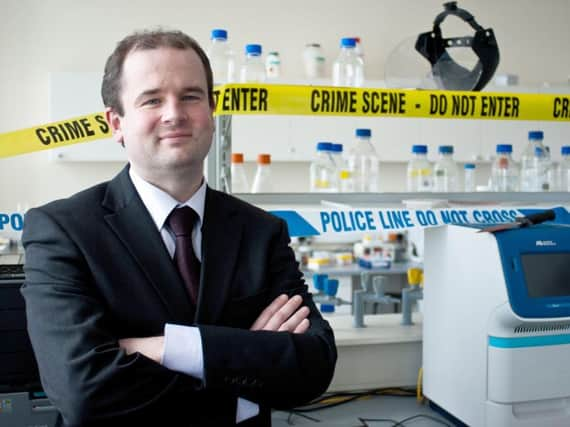'I cut my hand '“ and spent three months in a coma' - How '˜harmless' little cut almost led to Preston lecturer Michael losing his life


This is how Dr Michael Porter describes the sepsis which took hold of his body and almost killed him despite stemming from a small and what he thought inconsequential cut to his hand.
Michael, 45, who is a lecturer in molecular genetics and cell biology at the University of Central Lancashire in Preston, was struck by the potentially deadly condition after infection spread from a cut on his hand.


Advertisement
Hide AdAdvertisement
Hide AdAlthough Michael is an expert in sepsis and has lectured students on what causes sepsis and how to spot the signs, the infection had taken such a grip of his body and clouded his judgement, he was unable to recognise the symptoms himself.
It was only due to the quick-thinking of his brother Martin who suspected sepsis that Michael was rushed to hospital where he was given urgent medical treatment.
But by this point Michael was desperately ill and his body had gone into multiple organ failure and his family were warned he was unlikely to survive.
Michael, who is married to Nicola, recalls: “I had been doing a bit of DIY a couple of days earlier and repairing a garden gate when I cut my hand on a metal nail on the gate.
Advertisement
Hide AdAdvertisement
Hide Ad“It was not a severe cut and it didn’t need stitches or anything like that.
“There was a bit of blood but nothing unusual so I just gave my hand a quick wash under the tap and didn’t give it another thought.
“But some bacteria must have got into the cut.”
Michael is originally from Newton Mearns, East Renfrewshire, near Glasgow and a couple of days after experiencing the cut, he went up there to visit family for a few days.
Michael realised he felt a bit under the weather but thought he just had a bug which he would get over.
Advertisement
Hide AdAdvertisement
Hide AdMichael explains: “I became more unwell and the classic signs of sepsis were starting to become apparent.
“But because I was feeling so unwell, I wasn’t recognising them despite the fact that I had taught students about sepsis.
“Thankfully, my brother Martin spotted some of the signs of sepsis. In my case, this was severe shivering, severe muscle pain, confusion and breathlessness.
“My brother recognised these symptoms and the whole family rushed me to A&E and my brother asked the doctors if it could be sepsis.”
Advertisement
Hide AdAdvertisement
Hide AdMichael was taken to University Hospital Hairmyres near Glasgow and by this point, he was in multiple organ failure.
Michael had tests and treatment including intravenous antibiotics and deteriorated so rapidly, he went into a coma.
Michael says: “My family were warned that I was unlikely to survive the night.
“Hospital staff told them that I had more chance of winning the Lottery than surviving.
Advertisement
Hide AdAdvertisement
Hide Ad“The doctors were being very positive and told my family they were doing everything in their power to save me but they wanted to prepare them as my chances were not good at all.
“Things were so bad that my parents were actually planning my funeral.
“My wife went through the same trauma as the rest of my family. We had only been married for three years at that point and she feared she was going to be left a widow and would lose me.”
Michael had to be hooked up to artificial respiration and have kidney dialysis and remained in a coma for three months.
Advertisement
Hide AdAdvertisement
Hide AdMichael remembers: “I have a very vague memory of being in A&E but after that, the first proper memory I have is of waking up after the coma.
“Three months of my life had completely gone.
“I can remember having vivid and horrible dreams while I was in the coma. In these dreams, I was dying and desperately trying to live and stay with my family as I didn’t want to die.”
After awakening from his coma, Michael began the long process of recovery and physiotherapy. His muscles had wasted away and he had to re-learn to move and walk.
His weight had also plummeted from around 13 stones to seven stones.
Advertisement
Hide AdAdvertisement
Hide AdMichael battled back to health over a period of about nine months.
Remarkably, Michael made a full recovery. But around 40 per cent of people who suffer sepsis have lasting physical or mental symptoms so he knows how lucky he is.
Michael says: “Thankfully, I have recovered completely and don’t have any lasting problems so I consider myself extremely lucky.”
Michael says he owes his life to his brother Martin for recognising the signs of sepsis and realising he needed to get straight to hospital.
Advertisement
Hide AdAdvertisement
Hide AdMartin is an NHS consultant but Michael says you don’t have to be a medic to spot the signs of sepsis and anyone in the general public would recognise them if they were aware of them.
He says: “If I had not been so unwell, I would have recognised the signs of sepsis myself.
“But I just thought I had a bit of a bug and that I would shake it off.
“If I had waited to get over it, I would have been found dead.
Advertisement
Hide AdAdvertisement
Hide Ad“I am incredibly thankful to my brother Martin. If he had not spotted those critical signs in time or if my treatment in hospital had been delayed by even an hour, I would have died.”
Michael says the irony of the fact he actually lectured in sepsis and then almost died of it himself does not escape him.
He says: “It is deeply ironic as I was lecturing about sepsis to medical students and scientists.
“It is one of those things you teach but you never actually think it will happen to you.
Advertisement
Hide AdAdvertisement
Hide Ad“Unfortunately, sepsis is a hidden condition and it is far more common than people realise. “My sepsis was caused by bacteria that got in through the cut. It was a strep infection which usually gives you a sore throat.
“But in this case, it set off a chain reaction in my body.”
Michael now carries out talks about sepsis to the medical profession and the public and is a member of the UK Sepsis Trust.
He says: “Sepsis can be triggered in many different ways such as through an insect bite, a urinary tract infection or an ulcer to the leg.
“I have also seen it in some cases from radiotherapy wounds. There are so many ways to get it and it is caused by anything that lets infection into the body.
Advertisement
Hide AdAdvertisement
Hide Ad“The immune system becomes uncontrolled which leads to sepsis. I don’t ever want to forget the feeling of waking up and realising I had lived despite this ordeal.
“I am now living every day as if it is my last.
“It has given me a renewed zest for life and I do things for the here and now rather than putting them off for the future.
“We now have a chocolate Labrador called Oscar. We had always talked about getting a dog at some point, but after my illness, we realised tomorrow might never come so decided to get a dog now.
“Oscar is absolutely adorable and having him has been a massive help to my recovery as well as all the support I have had from my family.”
Advertisement
Hide AdAdvertisement
Hide AdMichael, who was a lecturer at the University of Bradford, became a lecturer at the UCLan in June and is looking forward to welcoming his first cohort of students in Preston.
Michael says: “I was attracted to come to UCLan because of its reputation for being a fantastic place for students.
“I want to carry on raising awareness of sepsis and encouraging people to be aware of the symptoms.
“The message to get out there is for people to ask: ‘Could it be sepsis?’ and having the confidence to dial 999 and ask that question.
“It could save the life of their friends or family.
“If I can help raise awareness and save another life, it will be worthwhile.”
